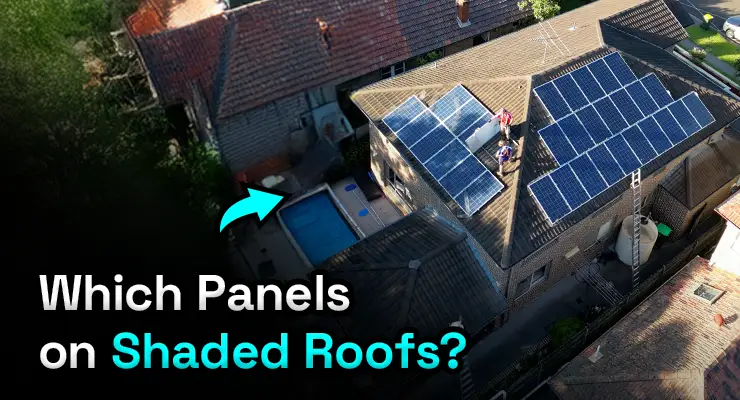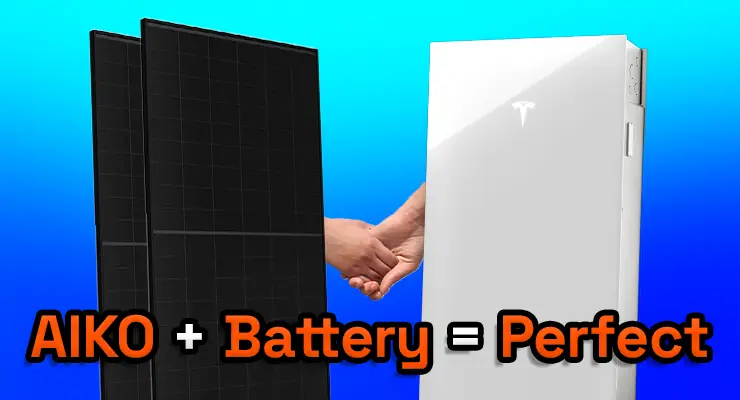Fast read
As more people use renewable energy systems, worries about EMFs and radiation from solar panels and inverters have increased. However, these worries are largely unfounded. Solar panels convert sunlight into electricity without emitting radiation.
Inverters produce low-intensity EMFs, significantly weaker than common household appliances. These EMFs comply with safety standards set by organisations like the ICNIRP and IEEE. Solar panels and inverters undergo strict testing and certification, ensuring safety.
In short, solar power is a safe and environmentally friendly energy source. It helps to debunk myths and show that it is safe for both users and the environment.
Should you be worried about your solar panels emitting radiation?
As more people turn to renewable energy sources, solar panels have become a popular and eco-friendly choice. However, some concerns have come up about electromagnetic fields (EMFs) and whether solar panels and inverters emit harmful radiation. These worries have led to several misconceptions. In this guide, we’ll explain the facts, debunk common myths, and help you understand the EMFs and radiation from solar energy systems.
Electromagnetic fields (EMFs) are invisible areas of energy created by electricity. They occur naturally and are also produced by many devices we use daily, like microwaves and cell phones. EMFs are divided into two types: low-frequency and high-frequency. Low-frequency EMFs come from things like electrical wiring and appliances, while high-frequency EMFs are from devices like cell phones.
Solar panels and inverters mainly produce low-frequency EMFs. The EMF levels from solar systems are much lower than those from common household devices, such as refrigerators and televisions. The inverters used in solar systems do emit some EMFs, but they are still within safe limits set by international safety standards.
A common myth is that solar panels emit harmful radiation that can cause health issues. This is not true.
Solar panels convert sunlight into electricity without giving off any harmful radiation. The EMFs from solar panels and inverters are non-ionising, which means they don’t have enough energy to damage human cells. Non-ionising radiation is safe and found in everyday items like radio signals and Wi-Fi routers.
The basics of solar panels and inverters
First, we need to understand how solar panels and inverters work before we look into the EMFs and radiation they produce.
Solar panels:
Solar panels are the heart of any solar energy system. They work by harnessing the power of sunlight to generate electricity through a process known as the solar photovoltaic effect. Multiple layers of semiconductor materials, usually silicon, absorb sunlight’s photons, which release electrons, ultimately creating an electric current. Notably, this process does not involve the emission of radiation or electromagnetic fields.
Inverters:
Inverters are essential components in solar energy systems. Their main job is to change the electricity from solar panels into the type of electricity that powers homes and businesses. Inverters introduce a minimal level of electromagnetic fields due to the electrical currents and switching processes in their operation.

Understanding electromagnetic fields (EMFs)
EMFs from solar inverters:
Solar inverters can generate low-frequency electromagnetic fields. These fields result from the electrical currents and switching mechanisms within the inverter. It’s important to note that the EMFs from solar inverters are usually weak and have a low frequency. They fall well within established safety limits and guidelines set by organisations like the International Commission on Non-ionising Radiation Protection (ICNIRP) and the Institute of Electrical and Electronics Engineers (IEEE).
Comparative weakness:
Solar inverters emit weaker EMFs than household appliances like TVs, fridges, or microwaves. The distance between the inverter and living or working areas can reduce exposure to low-intensity fields. This can help lower health risks.
Certification and compliance:
Manufacturers subject solar panels and inverters to rigorous testing and certification processes to ensure compliance with safety standards. Regulatory bodies enforce limits on electromagnetic emissions, and independent testing laboratories assess compliance before these products reach the market. These stringent measures provide assurance of safety.
Understanding radiation
Solar panels and radiation:
Solar panels do not emit ionising radiation, which is the type of radiation associated with health risks, such as X-rays or gamma rays. They generate electricity through a non-radioactive process by converting sunlight into electricity. Therefore, there are no radiation risks associated with the use of solar panels.
Inverters and radiation:
Similarly, inverters do not produce ionising radiation. They operate with standard electrical currents that do not emit ionising radiation. As a result, concerns about radiation risks from solar inverters are unfounded.
Safety and compliance:
Adherence to regulatory standards and compliance with non-ionising radiation limits ensure the safety of solar panels and inverters. These stringent measures guarantee that solar power systems are safe for both users and the environment.

Addressing misconceptions
Myth: Solar panels emit harmful radiation
Reality: Solar panels do not emit any form of radiation. They generate electricity through a non-radioactive process by converting sunlight into a usable electrical current.
Myth: Inverters produce dangerous electromagnetic fields
Reality: Inverters generate low-frequency electromagnetic fields that are of low intensity and well within established safety limits. These fields are weaker than those emitted by common household appliances.
Myth: Solar energy systems pose radiation risks
Reality: Solar energy systems, including both panels and inverters, are safe and do not pose any radiation risks. They undergo rigorous testing and certification processes to ensure compliance with safety standards.
Do Solar Panels Emit Radiation?
In conclusion, solar panels and inverters do not emit harmful radiation or electromagnetic fields that can pose health risks. Solar panels work by converting sunlight into electricity through a non-radioactive process. Inverters create weak electromagnetic fields known as EMFs. These EMFs have lower intensity and frequency compared to devices like microwaves or cell phones commonly used in households.
Safety rules and checks are in place to make sure solar energy systems are safe for people and the environment. These standards are set by organisations like the World Health Organisation (WHO) and the International Commission on Non-Ionising Radiation Protection (ICNIRP). Solar systems meet these guidelines, which means they are safe to use.
Solar power is a safe and eco-friendly energy source. It is becoming more popular as the world seeks cleaner and more sustainable energy sources. Understanding and debunking myths about solar panels and inverters helps clear up confusion and reassure people about their safety. Sharing correct information can help more people switch to solar energy, which is good for the environment and society.
In summary, there is no need to worry about harmful radiation or EMFs from solar panels and inverters. These solar PV systems are designed to be safe and are backed by strict safety standards. Solar energy remains a reliable and green choice for the future.



